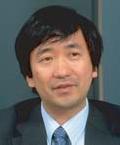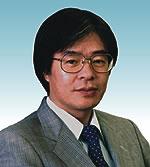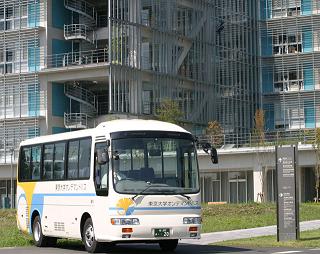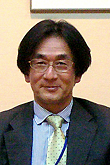| Cource 1:the University of Tokyo | |
| Information and Robot Technology Research Initiative (IRT) | |
 |
Director: Prof. Isao Shimoyama |
| What is IRT? IRT is a new technological domain created by the integration of information technology (IT), which encompasses high-speed computing and network and software technologies, and robot technology (RT), whose forms and movements function in the physical world. IT, formed from technologies of the cyberworld, has the power to process information in the real world through communication and computer technologies. It promises to have even more advanced capabilities in the future. RT, formed from the technologies of the physical world, has advanced greatly in reliability and real-world functionality. By integrating IT and RT, IRT innovations promise to give birth to industries that support life and society, and to bring about social transformations. ->more information |
|
| Micro and Nano Systems for Bio and Analytical Technologies | |
 |
Prof. Takehiko Kitamori |
| Micro integrated chemical systems are expected as promising ultra high throughput chemical and bio processors with extremely small volume. Our research groups have proposed and developed the original methodologies for micro integration of general chemical systems as well the electrophoresis analysis. ->more information |
|
| Center for NanoBio Integration | |
 |
Prof. Kazunori Kataoka |
|
"NanoBio Integration" promotes the understanding of the structure and
functions of the body on a nanoscale and also the development of nanomachines in
which bioinspired structures and functions are incorporated and methodologies
are extracted that regulate the functions of body components, including
biomolecules and cells, to integrate them into nanodevices. Thereby, we will try
to establish the intellectual foundation and the interdisciplinary scientific
technological system, which explores and reveals the nature of biofunctions on a
nanoscale based on nanotechnology and materials technology. Eventually we wish
to promote as the five-year strategic goals, the construction of an
innovative"nanomedical" system based on nano-level spatiotemporal bioregulation
and the establishment of futuristic innovative new nanobio industries. To
effectively achieve this goal beyond the traditional disciplinary boundaries, we
set three subthemes related to three important nanobio functions: (1) creation of bioinspired nanomachines, (2) creation of an accurate spatiotemporal control-type
biosensing system and (3) creation of
nanotechnology and materials technology for nanoscale cell therapy.
Moreover, by disseminating broadly at home and abroad new results of"nanobio
integration" research, we aim to promote the academic paradigm shift that
realizes further disciplinary integration and the rise of new environmental and
information industries. |
|
| On-demand Bus | |
 |
Prof. Hiroyuki Yamato |
| A new "on-demand bus" system has been developed by Yamato Laboratory of Graduate School of Frontier Sciences, The University of Tokyo. The system aims at the usefulness and efficiency of local transportation, which means that the system is very favorable for aged people, mothers with young children and foreigners, etc. The laboratory has also carried out the field experiments of the on-demand bus in seven cities in Japan including Kashiwa City, Chiba prefecture. "On-demand bus" is a new means of transportation that the customers make a reservation to ride it. The bus runs according to the reservation including the customer's origin, destination and the time they would like to ride it. No route and timetable are given in advance. The system was found to be able to provide a solution for inconvenient transportation in the rural areas, to solve the busy traffic in satellite cities around a large metropolis, and to reduce the consumption of fuel and the emission of green house effect gas and polluting matter. The outline of the system and the experiments will be shown at the tour (at room #306, 3F, Faculty of Engineering Building #3). ->more information |
|
 |
|
| The vehicle for "on-demand bus" experiment by the laboratory (at Kashiwa Campus, The University of Tokyo) |
|
| Course 2: AIST Tokyo Waterfront | |
| The Biomedicinal Information Research Center (BIRC) | |
 |
Director: Dr. Ichio Shimada |
| Fundamental Technologies for Drug Discovery in the Post-Genomic Era The Biomedicinal Information Research Center (BIRC) was established in April, 2008 in the Tokyo Bay Area as the successor institution to the Biological Information Research Center. BIRC is a core center for post-genomic research, analyzing the structure and fundamental technologies of drug discovery. BIRC focuses on post-genome sequence research, such as the analysis of protein-protein interactions using human full-length cDNAs; structural analysis of membrane proteins, which are main targets in drug discovery and studies of bio-active compounds by means of computational science and the use of microbial metabolites in order to achieve the ultimate goal of developing fundamental technologies for drug discovery. Functional analysis of non-coding RNA is a new research area which introduces a novel paradigm to the field of biomedicinal research. An integrated database is being complied, annotating data on human full-length cDNAs as well as the results of interaction studies, and contributes to life science research by making the information freely accessible on the web. BIRC will promote strategic joint-research projects reflecting industrial needs under collaboration with government, industry and academia. ->more information |
|
| Protein Structural Information Analysis Team | |
 |
Team Leader: Dr. Kaoru Mitsuoka |
| Protein Structural Information Analysis Team Focuses on developing novel
techniques for the determination of membrane protein structures, analyzing
ligand-protein interactions and obtaining high quantities of purified membrane
proteins. It is hoped that applying these techniques to selected proteins
will result in the solution of their structures, the identification of
their molecular function and then the discovery of new therapeutics for
the benefit of mankind. Additionally, the group is performing high stringency
modeling of membrane proteins and in-silico screening of ligand-receptor
binding. ->more information |
|
| Functional RNomics Team | |
 |
Team Leader: Dr. Tetsuro Hirose |
| Functional RNomics Team is studying on non-protein-coding RNAs, so-called non-coding RNAs, which have been discovered in the recent transcriptome analyses. The aim of our team is to establish fundamental principle of ncRNA function and to identify the functional RNA species for industrial application. Our approach to the functionally unknown non-coding RNAs involves the development of novel bioinformatics tools and of new analytical technology, and also the functional analyses utilizing such new technologies. ->more information |
|
| Biological Systems Control Team | |
 |
Team Leader: Dr. Tohru Natsume |
| Biological Systems Control Team performs functional analysis of the genes
and proteins derived from 30,000 cDNA clones that have been provided by
collaborators since 1998. The specific goals of the group are as follows:
(i) To construct an infrastructure capable of producing proteins using
cDNAs. (ii) To obtain expression profiles for genes expressed in numerous
cell and tissues. (iii) To study protein-protein interactions in living
cells. (iv) To pertorm screening employing microbial metaborites to find
bioactive compounds which regulate the interactions and phenotypic information.
Currently, these analyses are being carried out on a colossal scale and
at a rapid rate. We hope to begin reaping the benefits of our high-throughput
analysis through the application of state of the art bioinformatics techniques. ->more information |
|



